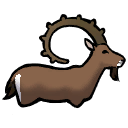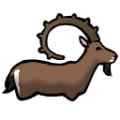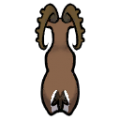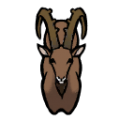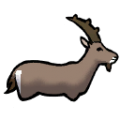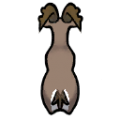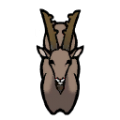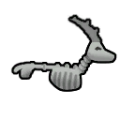Difference between revisions of "Ibex"
| (35 intermediate revisions by 6 users not shown) | |||
| Line 1: | Line 1: | ||
| − | {{verified| | + | {{infobox main|animal| |
| + | | page verified for version = A14C | ||
| + | | name = Ibex | ||
| + | | image = IbexMALE east.png | ||
| + | | description = The wild ancestor of the domesticated goat. Ibexes live on marginal territory where most antelopes couldn't survive, eating lichens and sparse mountain plants. They're famous for dextrously hopping across bare cliff faces - and for their violent ramming attack. | ||
| + | | type = Animal | ||
| + | | movespeed = 4.6 | ||
| + | | min comfortable temperature = -30 | ||
| + | | max comfortable temperature = 40 | ||
| + | | flammability = 0.7 | ||
| + | | marketvalue = 250 | ||
| + | | filth rate = 16 | ||
| + | | herdanimal = true | ||
| + | | combatPower = 50 | ||
| + | | bodysize = 1 | ||
| + | | healthscale = 0.85 | ||
| + | | hungerrate = 0.2 | ||
| + | | diet = herbivorous | ||
| + | | leathername = plainleather | ||
| + | | wildness = 0.55 | ||
| + | | manhuntertame = 0 | ||
| + | | manhunter = 0 | ||
| + | | roamMtb = 2 | ||
| + | | trainable = none | ||
| + | | mateMtb = 12 | ||
| + | | gestation = 5.661 | ||
| + | | offspring = 1 | ||
| + | | lifespan = 15 | ||
| + | | juvenileage = 0.1 | ||
| + | | maturityage = 0.2222 | ||
| + | | tradeTags = AnimalCommon | ||
| + | | attack1dmg = 8 | ||
| + | | attack1type = Blunt | ||
| + | | attack1cool = 2 | ||
| + | | attack1part = front left leg | ||
| + | | attack2dmg = 8 | ||
| + | | attack2type = Poke | ||
| + | | attack2cool = 2 | ||
| + | | attack2part = front left leg | ||
| + | | attack3dmg = 8 | ||
| + | | attack3type = Blunt | ||
| + | | attack3cool = 2 | ||
| + | | attack3part = front right leg | ||
| + | | attack4dmg = 8 | ||
| + | | attack4type = Poke | ||
| + | | attack4cool = 2 | ||
| + | | attack4part = front right leg | ||
| + | | attack5dmg = 8 | ||
| + | | attack5type = Bite | ||
| + | | attack5cool = 2 | ||
| + | | attack5part = teeth | ||
| + | | attack5chancefactor = 0.5 | ||
| + | | attack6dmg = 10 | ||
| + | | attack6type = Blunt | ||
| + | | attack6cool = 2.6 | ||
| + | | attack6part = head | ||
| + | | livesin_temperateforest = 0.5 | ||
| + | | livesin_temperateswamp = 0.5 | ||
| + | | livesin_borealforest = 0.5 | ||
| + | | livesin_tundra = 2 | ||
| + | | livesin_coldbog = 0.5 | ||
| + | }} | ||
| + | The '''ibex''' is a large wild goat. Males of the species are called '''Ibex rams''' and have large rounded horns and a darker brown color, while females are called '''ibex does''' and have shorter, straighter horns and a lighter brown color. | ||
| + | |||
| + | == Taming == | ||
| + | Ibex can be tamed wild from {{Habitats|{{PAGENAME}}|or}}, randomly join your colony in an event, or bought pre-tamed from a trading ship. | ||
| + | |||
| + | == Summary == | ||
| + | {{Pen Animal Note|Ibex}} | ||
| − | + | == Analysis == | |
| − | + | Ibex are one of the best animals to ranch for food and leather. They don't have any utility beyond food production. | |
| − | + | ||
| − | + | ===Nutrition=== | |
| − | + | When slaughtered, an ibex yields {{#vardefineecho:baby_meat|{{Meat Leather Curve|{{#expr:{{P|Body Size}}*0.2*140}}}}}} meat and {{Meat Leather Curve|{{#expr:{{P|Body Size}}*0.2*40}}}} leather as a baby; {{Meat Leather Curve|{{#expr:{{P|Body Size}}*0.5*140}}}} meat and {{Meat Leather Curve|{{#expr:{{P|Body Size}}*0.5*40}}}} as a juvenile; or {{Meat Leather Curve|{{#expr:{{P|Body Size}}*140}}}} meat and {{Meat Leather Curve|{{#expr:{{P|Body Size}}*40}}}} leather as an adult. 1 meat is equal to 0.05 nutrition. | |
| − | + | ||
| − | | | + | An adult ibex consumes {{P|Real Hunger Rate}} nutrition per day, and a female creates up to {{#expr: 1/{{P|Gestation Period Days}} round 2}} offspring per day. |
| − | | | + | * When offspring are slaughtered as babies, a female ibex will produce {{#expr:{{Meat Production|{{PAGENAME}}|baby}} round 2}} nutrition of meat per day, giving a potential nutrition efficiency of {{%|{{Meat Production|{{PAGENAME}}|baby}}/{{P|Real Hunger Rate}} round 3}}. |
| − | | | + | * If the offspring are allowed to grow to adulthood, they will consume an additional {{#expr:{{Nutrition Consumption|{{PAGENAME}}|adult}} - {{P|Real Hunger Rate}} round 2}} nutrition per day, but will instead yield {{#expr:{{Meat Production|{{PAGENAME}}|adult}} round 2}} nutrition per day as they are slaughtered, resulting in a potential nutrition efficiency of {{%|{{Meat Production|{{PAGENAME}}|adult}}/{{Nutrition Consumption|{{PAGENAME}}|adult}} round 3}}. |
| − | | | + | When considering a population of equal numbers of males and females, these nutrition efficiencies fall to {{%|{{Meat Production|{{PAGENAME}}|baby|1|1}}/{{Nutrition Consumption|{{PAGENAME}}|baby|1|1}} round 3}} for baby slaughter and {{%|{{Meat Production|{{PAGENAME}}|adult|1|1}}/{{Nutrition Consumption|{{PAGENAME}}|adult|1|1}} round 3}} for adult slaughter. |
| − | | | ||
| − | | | ||
| − | | | ||
| − | |||
| − | | | ||
| − | | | ||
| − | | | ||
| − | | | ||
| − | | | ||
| − | | | ||
| − | | | ||
| − | | | ||
| − | | | ||
| − | | | ||
| − | | | ||
| − | | | ||
| − | | | ||
| − | | | ||
| − | | | ||
| − | | | ||
| − | | | ||
| − | | | ||
| − | | | ||
| − | | | ||
| − | | | ||
| − | | | ||
| − | | | ||
| − | | | ||
| − | }} | ||
| − | + | Ibex are one of, if not the best, animals to ranch. They are superior to [[horse]]s, [[gazelle]]s, and [[cow]]s, at least for the sole purpose of food. Certain animals are more ''nutritionally'' efficient, but take more work to manage. | |
| − | + | * [[Tortoise]]s are the single best animal for nutrition efficiency. However, tortoises are not pen animals, meaning they will eventually untame. They require much more work to maintain their tameness, or need to be micromanaged so that they are always slaughtered just before they run wild. | |
| + | * When considering different populations of male:females, [[chicken]]s are potentially more nutritionally efficient. However, they are significantly more work-intensive to slaughter and butcher, and do not yield any leather. | ||
| − | ==Training== | + | == Training == |
{{TrainingTable}} | {{TrainingTable}} | ||
| + | == Health == | ||
| + | {{Animal Health Table|QuadrupedAnimalWithHooves}} | ||
| + | |||
| + | == Gallery == | ||
| + | <gallery> | ||
| + | IbexMALE east.png|Ibex ram facing east | ||
| + | IbexMale north.png|Ibex ram facing north | ||
| + | IbexMale south.png|Ibex ram facing south | ||
| + | Dessicated ibexmale east.png|Ibex ram decaying | ||
| + | </gallery> | ||
| + | <gallery> | ||
| + | IbexFemale east.png|Ibex doe facing east | ||
| + | IbexFemale north.png|Ibex doe facing north | ||
| + | IbexFemale south.png|Ibex doe facing south | ||
| + | Dessicated ibexfemale east.png|Ibex doe decaying | ||
| + | </gallery> | ||
{{nav|animal}} | {{nav|animal}} | ||
[[Category:Animals]] | [[Category:Animals]] | ||
| − | [[Category:Wild]] | + | [[Category:Wild animal]] |
Latest revision as of 03:32, 16 July 2024
Ibex
The wild ancestor of the domesticated goat. Ibexes live on marginal territory where most antelopes couldn't survive, eating lichens and sparse mountain plants. They're famous for dextrously hopping across bare cliff faces - and for their violent ramming attack.
Base Stats
- Type
- Animal
- Flammability
- 70%
Pawn Stats
- Combat Power
- 50
- Move Speed
- 4.6 c/s
- Health Scale
- 85% HP
- Body Size
- 1
- Mass - Baby
- 12 kg
- Mass - Juvenile
- 30 kg
- Mass - Adult
- 60 kg
- Carrying Capacity
- 75 kg
- Filth Rate
- 16
- Hunger Rate
- 0.32 Nutrition/Day
- Diet
- herbivorous
- Life Expectancy
- 15 years
- Manhunter Chance
- 0%
- Manhunter Chance (Taming)
- 0%
- Trainable Intelligence
- None
- Wildness
- 55%
- Minimum Handling Skill
- 4
- Roam Interval
- 2 days
- Mate Interval
- 12 hours
- Maturity Age
- 0.222 years (13.3 days)
- Juvenile Age
- 0.1 years (6 days)
- Comfortable Temp Range
- -30 °C – 40 °C (-22 °F – 104 °F)
Production
- Meat Yield
- 140
 ibex meat
ibex meat - Leather Yield
- 40
 plainleather
plainleather - Gestation Period
- 5.661 days
- Offspring Per Birth
- 1
Melee Combat
- Attack 1
- Front left leg
8 dmg (Blunt)
12 % AP
2 second cooldown - Attack 2
- Front left leg
8 dmg (Poke)
12 % AP
2 second cooldown - Attack 3
- Front right leg
8 dmg (Blunt)
12 % AP
2 second cooldown - Attack 4
- Front right leg
8 dmg (Poke)
12 % AP
2 second cooldown - Attack 5
- Teeth
8 dmg (Bite)
12 % AP
2 second cooldown
0.5 chance factor - Attack 6
- Head
10 dmg (Blunt)
15 % AP
2.6 second cooldown - Average DPS
- 2.46
- tradeTags
- AnimalCommon
The ibex is a large wild goat. Males of the species are called Ibex rams and have large rounded horns and a darker brown color, while females are called ibex does and have shorter, straighter horns and a lighter brown color.
Taming[edit]
Ibex can be tamed wild from temperate forests, temperate swamps, boreal forests, cold bogs, or tundra, randomly join your colony in an event, or bought pre-tamed from a trading ship.
Summary[edit]
Ibex are pen animals. Once tamed, pen animals cannot and do not need to be trained any further. But if left outside of a pen or caravan hitching spot, pen animals will eventually roam outside your colony. Making a caravan is not required to tie animals to a caravan hitching spot.
Analysis[edit]
Ibex are one of the best animals to ranch for food and leather. They don't have any utility beyond food production.
Nutrition[edit]
When slaughtered, an ibex yields 31 meat and 16 leather as a baby; 70 meat and 25 as a juvenile; or 140 meat and 40 leather as an adult. 1 meat is equal to 0.05 nutrition.
An adult ibex consumes 0.32 nutrition per day, and a female creates up to 0.18 offspring per day.
- When offspring are slaughtered as babies, a female ibex will produce 0.27 nutrition of meat per day, giving a potential nutrition efficiency of 85.6%.
- If the offspring are allowed to grow to adulthood, they will consume an additional 0.45 nutrition per day, but will instead yield 1.24 nutrition per day as they are slaughtered, resulting in a potential nutrition efficiency of 161.3%.
When considering a population of equal numbers of males and females, these nutrition efficiencies fall to 42.8% for baby slaughter and 113.8% for adult slaughter.
Ibex are one of, if not the best, animals to ranch. They are superior to horses, gazelles, and cows, at least for the sole purpose of food. Certain animals are more nutritionally efficient, but take more work to manage.
- Tortoises are the single best animal for nutrition efficiency. However, tortoises are not pen animals, meaning they will eventually untame. They require much more work to maintain their tameness, or need to be micromanaged so that they are always slaughtered just before they run wild.
- When considering different populations of male:females, chickens are potentially more nutritionally efficient. However, they are significantly more work-intensive to slaughter and butcher, and do not yield any leather.
Training[edit]
This animal can be trained as follows:
| Guard: | |
|---|---|
| Attack: | |
| Rescue: | |
| Haul: | |
*As of version 1.1.2610, all animals can be tamed. The percentage of likelihood of success depends on factors such as the Animals Wildness Percentage, Pawn Handling Skill, and others. More information can be found on the animals page.
Health[edit]
| Part Name | Health | Quantity | Coverage[1] | Target Chance[2] | Subpart of | Internal | Capacity[3] | Effect if Destroyed/Removed |
|---|---|---|---|---|---|---|---|---|
| Body | 34 | 1 | 100% | 26% | N/A[4] | - | Death | |
| Spine | 21.25 | 1 | 3% | 3% | Body | Moving |
−100% Moving[5] | |
| Stomach | 17 | 1 | 3% | 3% | Body | Digestion |
−50% Digestion | |
| Heart | 12.75 | 1 | 3% | 3% | Body | Blood Pumping |
Death | |
| Lung | 12.75 | 2 | 3% | 3% | Body | Breathing |
−50% Breathing. Death if both lost. | |
| Kidney | 12.75 | 2 | 3% | 3% | Body | Blood Filtration | −50% Blood Filtration. Death if both lost. | |
| Liver | 17 | 1 | 3% | 3% | Body | Digestion |
Death | |
| Neck | 21.25 | 1 | 22% | 5.5% | Body | Eating Talking Breathing |
Death | |
| Head | 21.25 | 1 | 75% | 2.475% | Neck | - | Death | |
| Skull | 21.25 | 1 | 25% | 1.2375% | Head | - | Cannot be destroyed Increasing Pain based on damage. | |
| Brain | 8.5 | 1 | 70% | 2.8875% | Skull | Consciousness |
Death Damage always results in scarring. | |
| Eye | 8.5 | 2 | 12% | 1.98% | Head | Sight |
−25% Sight. −100% if both lost. Damage always results in scarring. 0% Hit Chance against Blunt damage. | |
| Ear | 10.2 | 2 | 8% | 1.32% | Head | Hearing |
−25% Hearing. −100% if both lost. | |
| Nose | 8.5 | 1 | 10% | 1.65% | Head | - | - | |
| AnimalJaw | 8.5 | 1 | 10% | 1.65% | Head | Manipulation |
−100% Manipulation. Can no longer use Bite attack. | |
| Front Leg | 25.5 | 2 | 7% | 5.95% | Body | Moving |
−25% Moving. −50% if both lost. Can no longer use Hoof attack.[6] | |
| Front Hoof | 8.5 | 2 | 15% | 1.05% | Front Leg | Moving |
−25% Moving. −50% if both lost. | |
| Rear Leg | 25.5 | 2 | 7% | 5.95% | Body | Moving |
−25% Moving. −50% if both lost. | |
| Rear Hoof | 8.5 | 2 | 15% | 1.05% | Rear Leg | Moving |
−25% Moving. −50% if both lost. |
- ↑ Coverage determines the chance to hit this body part. It refers to the percentage of the super-part that this part covers, before its own sub-parts claim their own percentage. For example, if the base coverage of the super-part is 100%, and the coverage of the part is 20%, 20% of hits would hit the part, and 80% the super-part. If the part had its own sub-part with 50% coverage, the chances would be 10% sub-part, 10% part, 80% super part.
- ↑ Target Chance is the actual chance for each part to be be selected as the target when each part's coverage has been taken into account(I.E. Neck covers 7.5% of Torso but Head covers 80% of Neck so it actually has only a 1.5% chance to be selected). This is not pure hit chance, as different damage types propagate damage in different ways. See that page for details.
- ↑ Note that capacities can affect other capacities in turn. Only the primary effect is listed. See specific pages for details.
- ↑ This is the part that everything else connects to to be considered 'connected'.
- ↑ If Moving drops below 16% a pawn cannot move.
- ↑ A Blunt/Poke attack with cooldown of 2s. The actual Hoof is unrelated
